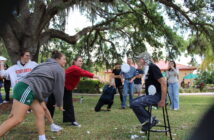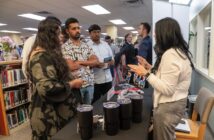
The Catholic Church and Christianity as a whole has had a complicated and unique relationship with Islam since its inception. In recent years, with concerns for Islamic extremism on the rise, it seemed fitting for Saint Leo University to have a speaker that can explain the nuances of Islam and clarify any misunderstandings students may have about the faith.
Dr. Gabriel Said Reynolds, an expert on the Koran who teaches at Notre Dame University, spoke at St. Leo University on Nov. 4th, and gave an invigorating and fascinating presentation on Islam. Prior to his talk, the event was invocated by Abbot Isaac, leader and chief spiritual advisor at St. Leo Monastery.
The Abbot said that “we are all on the same journey… That there can be no peace without prayer.”
Then Dr. Matt Tapie, who helped organize the event, spoke and explained the significance of Nostra Aetate, a document released by the Catholic Church explaining its relationship to other faiths. The document has just passed its fifty year anniversary (it was originally put into effect on Oct. 28th 1965), and Dr. Tapie made it clear that the document is relevant now more than ever.
Dr. Reynolds showed himself to be an incredibly affable man, one whose personality serves to complement his immense knowledge of Islam. He communicated how thankful he was for the opportunity to speak at St. Leo University, and that the talk would be split into six parts.
Reynolds first posed the question “Is Islam a religion like any other?”
Dr. Reynolds presents the fact that Islam is the only major World Religion to develop after Christianity, and the only major religion to directly address Christianity, and the importance of Jesus. The Koran even gives specific instructions on how Muslims are to treat Christians, and offers its own interpretation of who Jesus really is. In Islam, Jesus is considered a great figure, a normal man, a servant of God, and one of many prophets in the Koran.
The second part of Reynolds’ discussion talked about the God of the Koran, and what makes him unique. Dr. Reynolds talked about the oneness of God, and the importance in Islam of choosing how one talks about God.According to Dr. Reynolds, Islam emphasizes that even the name of God is holy, that a Muslim must never blaspheme or demean the name of God or the Prophet.
Dr. Reynolds then talked about “the problem of Shirk”; “Shirk” is considered the only unforgivable sin in Islam, it is literally the sin of “ascribing partners to Allah”. Shirk provides a challenge for Christianity because in certain circles of Islam, the Trinity is seen as a violation of Shirk. But there are other similar commandments against Idolatry in Christianity and Judaism.
Dr. Reynolds then shifted his focus onto the prophet Muhammad, and his importance and significance in Islam. He likened the relationship between Muslims and Muhammad, to the “what would Jesus do?” plastic bands that were popular a number of years ago. In Islam, Muslims are encouraged to imitate Muhammad in everything that they do, that Muhammad’s life is considered exactly how a human’s life should be led on Earth to honor God. Muhammad is considered to be the Last and greatest prophet of God. Muhammad’s revelations were considered so pure and special, that his life and his work as written in the Koran, are the immutable word of God.
The next section that Reynolds devotes his talk to is Islamic Law, otherwise known as “Sha’ria”. Much like how Muslims view Muhammad as a perfect example of a Godly man, they in turn view the Koran as the perfect example of every aspect of life, including how to govern. Certain Islamic nations have left behind some of the more problematic aspects of old Sha’ria Law, the aspects developed through tradition instead of through the Koran, such as the treatment of non-Muslims (a non-Muslim may not live above a Muslim person, for example, etc.).
Certain Extremist groups use Sha’ria law as a reason to enforce brutal laws on others. This misuse leads to the fifth part of Dr. Reynolds’ talk, a breakdown on the motives of the Islamic State and their justifications. The Islamic State of Iraq and the Levant (ISIL) are an example of extremism in Islam, they use brutality as a method of instilling fear, and they extort the belief that brutality is inherent to “true” Islam. ISIL’s main belief is that all other Islamic nations have gone astray from the Koran, and that all other nations are abominations in the eyes of Allah. But the ultimate goal for ISIL is to bring about the “ultimate confrontation” between Islam and the West, the Islamic Apocalypse. Even ISIL’s official magazine is named “Dabiq,” named after a small village in eastern Syria, which is said to be the site of the final battle of good and evil.
The sixth and final part of Dr. Reynold’s talk discussed the relationship between the Church and Islam. Reynolds’ speaks about how in Nostra Aetate the Church points out the commonalities between Christianity and Islam. Muslims and Christians both follow the same God, are commanded to be obedient to “inscrutable teachings” (praying five times a day), and that both religions are inherently monotheistic. Dr. Reynolds says that it is important that we promote dialogue between the two countries, not try and drive a wedge between them by becoming polemic in the way we teach the faith.
Dr. Gabriel Said Reynolds offered a deep and beautiful understanding of Islam and Koran (all while speaking flawless Arabic), and showed that theologically, Islam has more in common with Christianity than it has apart from it.




